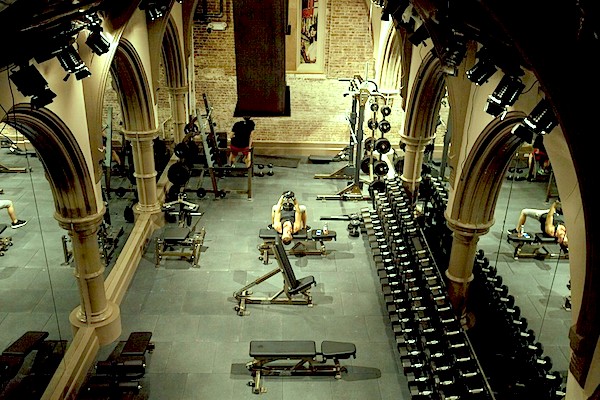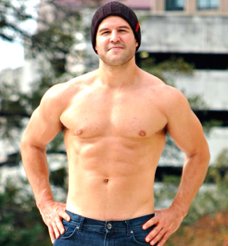How Chris Recovered From Alcoholism and Depression With Amino Acids, Nutrition, & Exercise
Chris looked like he “had it all” on the outside.
He had a job, a college degree, and lots of friends.
Yet on the inside he felt like a ticking time bomb full of depression and anxiety.
When it comes to depression, it doesn’t matter what’s on the outside when things are broken on the inside.
His depression started with alcohol but he had to do more than just quit alcohol to get back to normal.
Enter Chris:
Recovery From Depression & Alcohol Using Amino Acids, Nutrition, and Exercise
As a college student, I started binge drinking at parties. I made a lot of good friends and managed to hold my grades together. But at some point between my junior and senior years, a dark cloud gradually drifted over my life. As it got worse, I drank more to cope with it.

There seemed to be no reason for my emotional deterioration. I’d had a happy childhood, with no trauma or family issues, and my life path was going according to plan.
This sudden dark cloud was a mystery to me. I’d always felt upbeat and optimistic, but I started to dread simple things like going to the store. I stopped working out regularly and started gaining weight. My college roommates later told me that they thought my behavior was strange. I sometimes slept for entire days. They considered sitting me down to talk about their concerns, but they were worried about how I might react.
Even when I graduated and went to work for a great company, I had an overwhelming sense that life was bland and uninteresting. I felt temporarily relieved of this state of mind when I drank. I realized that I was severely depressed, and that I had been using alcohol for years as an antidepressant. How could I be depressed when there was nothing obviously wrong with my life? This question haunted me throughout my early twenties.
Hitting Rock Bottom While Trying To Quit Drinking
I had heard that alcohol was a depressant. Perhaps this was the root of my problem, and all I needed to do was quit drinking alcohol. I reasoned that if I stopped drinking, I would start to feel better.
And so every few months, I fought through withdrawals and used willpower to take a few weeks off of drinking. I made plans with friends and announced beforehand that I would not be drinking with them. They respected my abstinence periods, and came to expect them.
But because I was still depressed, I was not fun to be around. I felt mildly paranoid in public places and had to plaster a smile on my face. During nights out in which everyone seemed to have fun except for me, I would go home early and go to bed feeling defeated. Inevitably, I would start drinking again.
I reached a dead end by the age of 27. On the outside, I had a college degree, a job, and friends. On the inside, I was a ticking time bomb of depression, anxiety, and alcohol addiction. I saw a therapist, who told me that I had a physical addiction to alcohol and that this was responsible for all of my emotional pain. If this was true, then why didn’t I feel better several weeks after giving up alcohol?
Like many alcoholics, I did not quit drinking until I hit a physical rock bottom. I got to the point where I could no longer handle my dark thoughts. I was borderline suicidal and experiencing withdrawals like never before.
Exercise Was The First Step To Feeling Good Again
I asked my friends and family for support, and detoxed off of alcohol with the help of benzodiazepines and group support meetings.
When I left the facility, I began hitting heavy weights every day with a fury. Exercise made me feel alive by giving me endorphin rushes. Group meetings helped me realize that I was not alone, but the sad stories also made me feel more depressed. I stopped going to meetings and the gym became my cathedral to personal transformation.

Getting physically fit kept me away from alcohol by giving me a reliable natural high with no negative side effects. But even a year after I quit drinking, something was still missing. I often felt emotionally vacant when I wasn’t working out. I wondered, are alcohol, workouts and drugs the only real sources of pleasure in life?
There had to be more to life than alternating between feeling just okay and kind of sad. During dinners and holidays, I could tell that my friends and family thought that I was glum and boring. I lacked lighthearted energy; I rarely joked around like I used to. They didn’t want to say anything because they were afraid that I would start drinking again.
I began reading everything I could about mental health disorders. I slowly started grasping the truth of the matter, which I can now articulate a lot more clearly. Alcohol had caused my depression, but simply quitting drinking wouldn’t resolve my depression once and for all. What my years of drinking had really done was damage my system and deplete my body of nutrients and neurotransmitters. Until I reversed the damage I had inflicted on my body and brain, it would be impossible for me to feel normal again.
Using Nutrition and Supplements To Get To 100%

When Chris Felt Better He Started Randomly Joking Around With Cashiers
I cleaned up my diet and started taking omega-3 oil, magnesium and vitamin D. My results astounded me, because I expected nothing. I started feeling calmer and even happier within the first week of taking these supplements.
People noticed that my mood had brightened up a bit. I stopped being so uptight and slowly developed a brighter sense of life. I started randomly joking around with cashiers at the grocery store and holding doors for people.
I did more research to figure out if there were other supplements that might help me. I read books by Joan Mathews Larson and other authors who saw mental health problems as primarily biochemical disorders.
I bookmarked Dominate Depression, which further convinced me that nutrition was a missing piece of my mental health puzzle. I started taking amino acids such as L-Tyrosine, DLPA, and 5HTP. Amino acid therapy, as it’s called, almost immediately helped me to take more pleasure in everyday life and put an end to my insomnia.
TJ’s informative and uplifting blog also helped me see that many people suffer from mental health disorders that can be treated with nutrition. Without discovering the nutritional cornerstones of mental health, I wouldn’t be where I am today.
It’s been nearly three years since I had a drink. Because I have repaired my physiology, I have no desire to drink at all. It’s hard to explain this to people, because many of them will assume that you are a natural-holistic-organic nutcase. But my transformation speaks for itself.
Getting back in control of my mental health had little to do with willpower or positive thinking. I’ve found that these things come naturally when I give my body everything it needs to feel good in the first place.
These days, I feel good most of the time and fantastic after a hard workout. I feel high on life, better than I ever did during my drinking days, when I hang out with good friends. During a recent trip to Chicago for New Years’ Eve, I neither craved alcohol nor felt depressed. I was afraid that the boozy nature of the event would be a trigger for my old dark thoughts. But I finally proved to myself that a certain level of mental health is all anyone really needs to become the life of the party.
I’ve kept all of the supplements that helped me repair my brain. Now I only take them on occasion. Herbs like ashwagandha and lemon balm are very helpful in those rare instances when my energy levels are off, or when something specific is bothering me and I need help taking off the edge. My nutrient reloading was an important phase, not a permanent regime of pills. I’m grateful that I never got hooked on prescription medications.
I woke up today on a cold and cloudy January morning. I felt happy and well rested. Three years ago, I would have felt pangs of dread. I would have blamed my condition on the weather, and then poured myself a drink to numb myself through the morning.
I could have ended the vicious cycle much sooner if I’d known then what I know now. Giving my system the building blocks it needs to function normally was one of the best things I’ve ever done for myself.
 Chris Scott writes about addiction and fitness on his blog, Fit Recovery. After working in finance for five years, he became a personal trainer and enjoys helping people devise lifestyle strategies to align their mental and physical health.
Chris Scott writes about addiction and fitness on his blog, Fit Recovery. After working in finance for five years, he became a personal trainer and enjoys helping people devise lifestyle strategies to align their mental and physical health.
